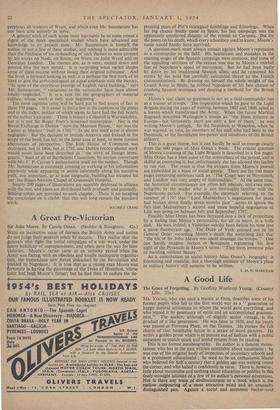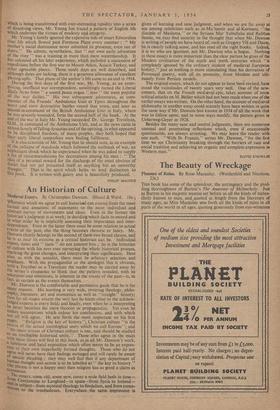A Good Life
MR. YOUNG, who was once a master at Eton, describes some of his former pupils who fell in the first world war as a " generation of happy natural aristocrats to whom the world gave everything, and who repaid it by generosity of spirit and an accomplished gracious- ness." The author, although of slightly senior vintage, is the product of a like generation. He was born in 1876, and his youth was passed at Formosa Place, on the Thames. He evokes the full charm of that hospitable house in a series of word pictures. He writes a golden prose which is at present out of fashion with a public impatient to snatch quick and useful returns from its reading.
This is no formal autobiography. Its author is a famous moun- taineer who has in the past written inimitably about mountains ; he was one of the original body of inspectors of secondary schools and is a prominent educationist ; he used to be an enthusiastic liberal who believed for half a century that a golden age was waiting round the corner, and who hailed it confidently in verse. There is, however, little about mountains and nothing about education or politics in this finely-wrought account of a few of its author's personal adventures. Nor is there any trace of disillusionment in a book which is the mellow outpouring of a most attractive mind and an unusually distinguished pen. Against a social and economic background
Which is being transformed with ever-increasing rapidity into a series 01 dissolving views, Mr. Young has traced a pattern of English life which enshrines the virtues of modesty and integrity.
Mr. Young's family ignored the expensive tide of smart Edwardian river life which flowed past Formosa Place every summer : " My mother's social dominance never admitted its presence, even out of doors." He admits, nevertheless, that " our own early adventure of the river " was a training in more than mere watermanship. It has coloured all his later experience, which included a succession of expeditions before the first war to Mount Athos, Asiatic Turkey, and other agreeable places. Those sunlit days are well described, and although dates are lacking, there is a generous allowance of excellent photographs. That phase of the author's life came to an end in 1914.
During the first days of the first war, Mr. Young, as an enter- prising, unofficial war correspondent, unwittingly turned the Liberal Daily News from " a sound peace organ " into " the most popular of the war dailies." His two subsequent adventures, as com- mander of the Friends' Ambulance Unit at Ypres throughout the worst and most destructive battles round that town, and later as second-in-command of the British Ambulance Unit in Italy, where he was severely wounded, form the second half of the book. At the end of the war in Italy Mr. Young succeeded Dr. George Trevelyan, 0.M., in command of the Ambulance Unit, and as the news came in almost hourly of falling dynasties and of the uprising, in what appeared to be disciplined freedom, of many peoples, they both hoped that their early liberal sympathies were finding fulfilment.
It is characteristic of Mr. Young that he should note, as an example of the collapse of standards which followed the outbreak of war, an unpleasant shock which he experienced when he was asked to supply a list of recommendations for decorations among his men : " The idea of a personal reward for the discharge of the most obvious of duties had not yet presented itself as anything but an unworthy thought." That is the spirit which helps to lend distinction to this book. It is written with gaiety and is beautifully produced.
PHILIP MAGNUS











































 Previous page
Previous page